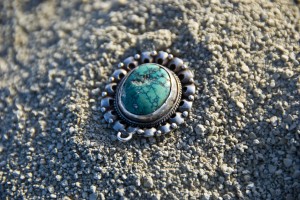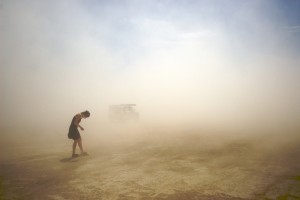
Leave No Trace, –noun, One of the most highly publicized aspects of the culture is Leave No Trace, often abbreviated as LNT. This principle is followed by even the smallest group wishing to be associated with the Burn. While regional events other than That Thing In The Desert may adopt their own alternative versions of the Burner Principles, this one is still universally practiced. It is not just good for the environment in an abstract way, but is also one of the main reasons that Burners are allowed to return again and again to the same public or private sites to hold their festivals and parties.
Many hours, days or even weeks of volunteer time are spent cleaning sites of trash and debris to return them to as pristine a condition as possible. This is done first by participants and members of theme camps, who may be penalized if their site is left in bad enough condition. Then, at Burning Man, the Department of Public Works takes over. These hard-working volunteers have even developed new techniques to face issues unique to playa cleanup, such as busting open the dunes that may form around discarded tents.
Of course, an event with as many generators, shade structures, outfits, and swag as the average Burn is going to produce waste and leave its mark on the environment, even before considering the supplies the community must bring in for basic survival. This principle is a goal to strive for and is meant to (and does) provoke debate about the best, least damaging way of doing our events.
The lexicographer has seen Leave No Trace cause conflicts between Burners and other subcultures. For example, many rennies have expressed frustration at criticism from Burners, because the trash at some renaissance faire encampments is actually cleaned up by paid employees.
The Lexicographer has been soliciting the opinion of other thoughtful Burners on the Ten Principles. Below you will find another opinion, but more are still welcomed. Use the contact information at the top to submit your thoughts.
Other entries in A BURNER LEXICON can be found at https://kitoconnell.com/lexicon/
Will is a newer member of the Texas burn community and a volunteer writer in my Burning Flipside Web Content Team. He offered these thoughts on Leave No Trace ethics:
Questions about environmentalism and burner events bugged me a lot at first, so I thought about it a whole lot. Unfortunately, I’ve concluded that getting out away from your city and seeing the majestic wilderness necessarily involves doing a bit of alteration to that wilderness, especially if you’re doing it in a group of thousands.
LNT is a great shorthand to remind people not to litter or tear up the trees or do anything that dramatically obnoxious to the land. However, humans and their environment are inseparably intertwined in all times and places!
So, if you think you’ve been able to traipse through a wilderness without leaving huge flaming trails of evidence behind you, it just means you’re not clued in to effects such as your footfalls (small plants and subterranean organisms care), your hot moist dirty breath (especially relevant in caves), and your smell (overwhelmingly apparent to many animals, whether or not you take a hot soapy shower twice a day, brush and floss, wear deodorant, and so on).

Even out at Black Rock City, I believe I remember reading that what seemed like a perfectly pristine post event desert, scrubbed clean by the winds, turned out to have all sorts of little effects in the ground from the heat of burning art and the pressure of tires and large sculptures; during the early years of Burning Man, not enough was known about the desert to know it, but as humans continue spending more time out there and looking closer, they have begun to figure it out.
However, BRC is only one tiny patch in a vast desert, most of which does not have to suffer through humans driving on it, building things on it, or burning things on it, except when some fool tries to set a land speed record in a jet car, and likewise, Apache Pastures is only one tiny corner of the vast miles of Texas farmland surrounding it. Also, unlike BRC, Apache Pastures was settled, cultivated land for hundreds of years before Flipside got there, and as far as I know we’re doing a pretty good job keeping it from eroding or otherwise taking any sharp turns for the worse.
If you’re looking for ways to help minimize the event’s impact, beyond just the basics of not littering or tearing up the trees or being a total pig, they are out there. It’d be good to avoid glitter and body paint, to be sure not to burn stuff that will create toxic smoke, including the paint and ink on the wood, not to pour out soap contaminated water of any kind on the ground or at least to make your dish and body soap as biodegradable as possible, and above all, to minimize internal combustion. Carpooling, packing light, choosing camp designs that minimize the use of electricity from generators for things like lights and speakers and fans and air-conditioned hexayurts, sharing generators and managing them carefully to make sure you don’t waste a lot of excess capacity, etc. All of this takes work and planning, and most people really like being able to join up with someone else’s carefully thought out plan for the carpool or the generator share or whatever so they don’t have to do it all themselves.
A true environmental purist would probably go the Quaker route: don’t own a car, don’t own nylon tents with aluminum poles, don’t own plastic sunglasses and other weather-resistant camping gear, and for parties, get together friends who all live within walking distance, at someone’s house or somewhere outdoors on some dry summer evening. However, I think Flipside is worth the environmental cost of all of us driving out there and back, and buying all the lights, paint, glow toys, music making electronics, and other gear necessary.